
Newsletter
Sign up and stay in-the-know about The Crowd & The Cloud and the world of citizen science.

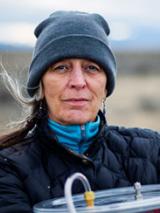
My name is Deb Thomas and I live on Line Creek in Clark, WY, which is on the Eastern side of Greater Yellowstone ecosystem along the Montana-Wyoming border. We’ve lived on this property for 21 years.
Tell us about yourself, and why is this land special to you?
My mother's parents came to this country from Italy to work the coal mines, and my father's family have been on the Beartooth Front for 4 generations. This place is my home, I have a very strong relationship with this area. Wyoming is a very beautiful state. It's very diverse. Dick and I have spent a lot of time in the outdoors, of course, because we both grew up in Montana and spent a lot of time tromping the hills, hiking and camping. When we had our son, Quinn, it was really important that we give him the kind of childhood that we had, with a creek and a lot of wildlife. To have clean air and clean water, appreciate the outdoors.
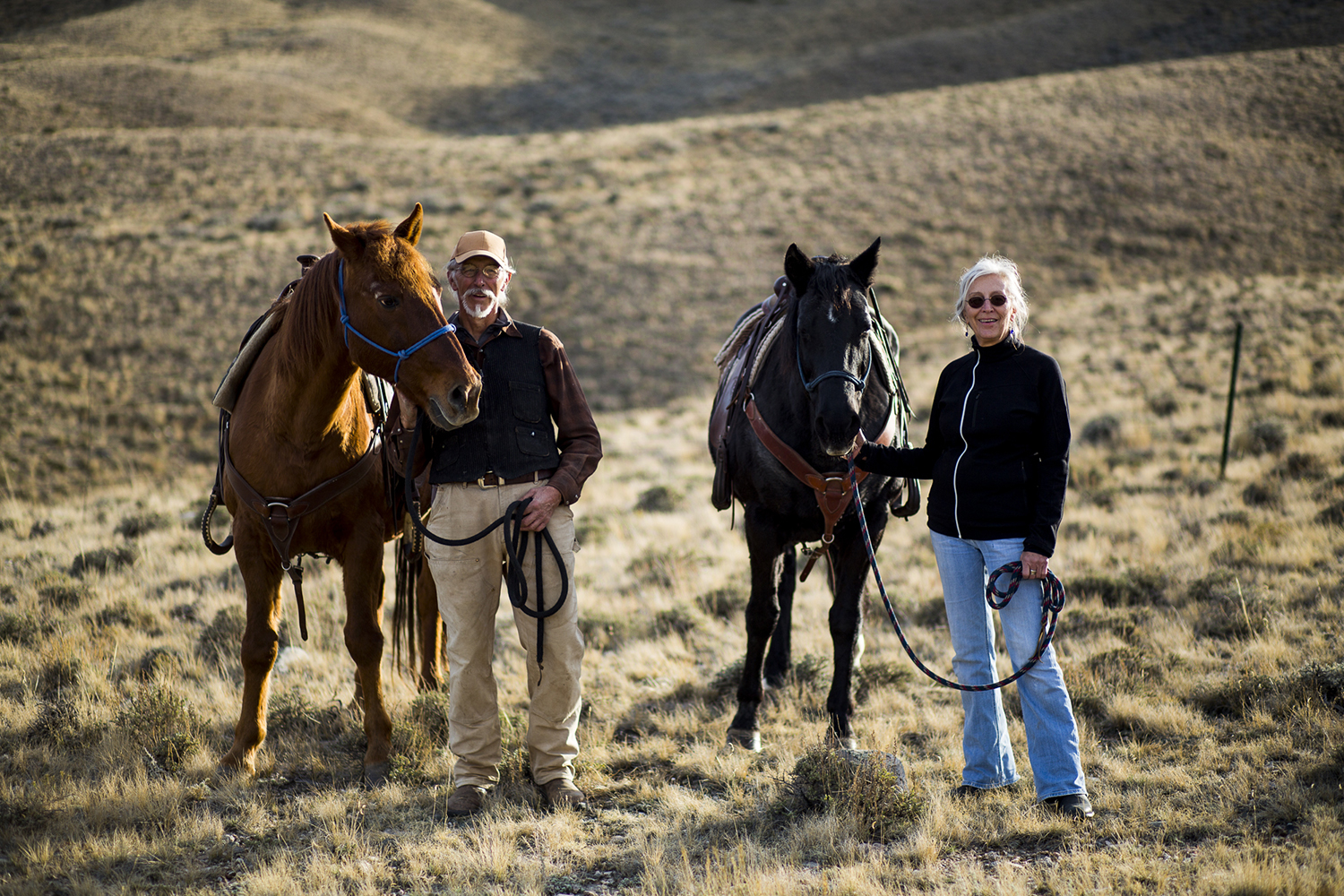
Deb and her husband Dick go horseback riding on public lands.
My husband is a huge horse enthusiast, so the big thing about buying this place was that we're surrounded by public land. We can literally leave this property and ride on horseback for days, weeks, if we'd want to. I think the way I feel about this place is "I belong here." I've lived in several different places throughout my life, but I've never had that feeling of belonging like I do here. So I've a very strong sense of protecting this area.
What was it like when the oil and gas companies moved in?
The first five years that we lived here were great. It was very quiet up here. We had a lot of wildlife, huge elk and deer herds that moved through here at that time. That was really beautiful. And beautiful skies because there were no lights, incredible stars. We were just getting ready to start building an eco-friendly house when the first oil and gas development started here. In fact when we moved to the property, there was still some oil wells set up on the ridge line. They'd been remediated, and we assumed that the gas development was gone from this area. There's a state section right across the road from us and we noticed that it was all flagged and surveyed, so we started trying to find out what it was. In Wyoming, on state land, companies can prepare the pad and put the pits in before they actually get their permit to draw oil. There was no record of what was going on there, the state couldn’t tell us anything, nobody could tell us what it was. That was very frustrating.
It's the same story you hear everywhere. This county road that we live on was just a little two-track, there was very little traffic up here at that time. The first rigs that came in were triple rigs, and it took over 100 double semis to pull the drill rig in. Originally, we were very worried about the creek, and what would happen to that water. They closed a natural drainage that came down out of the hills, and we get a lot of rain and flash floods so drainages are really important because that's how the water goes down into the creek and moves out. We knew that when it rained we were going to get everything from that pad down across our property, and right into the creek. There is really no consideration about who's living here or the wildlife and natural environment, water, air, or anything. It's all about what they can do that's easiest and cheapest for them.
There were spills and leaks, trucks going off the road and, of course, the rig operates 24/7. The pits were a huge concern for us, they were for drilling fluids and the wind ripped all of their liners. These kinds of wells test their pressures using a flare system. It was like a 747 taking off from the backyard, our house would just shake. So they bring the gas up and flare it beside the fluid pits, melting all the liners. Where is all this fluid going to go when there is no liner? I think they flared solid for three months. You could read the newspaper in the backyard at midnight because the lights were so bright, the flare was so bright. I was calling and making a complaint to the Sheriff's department every day because it was so horrible. I woke up in tears, I was a nervous wreck.
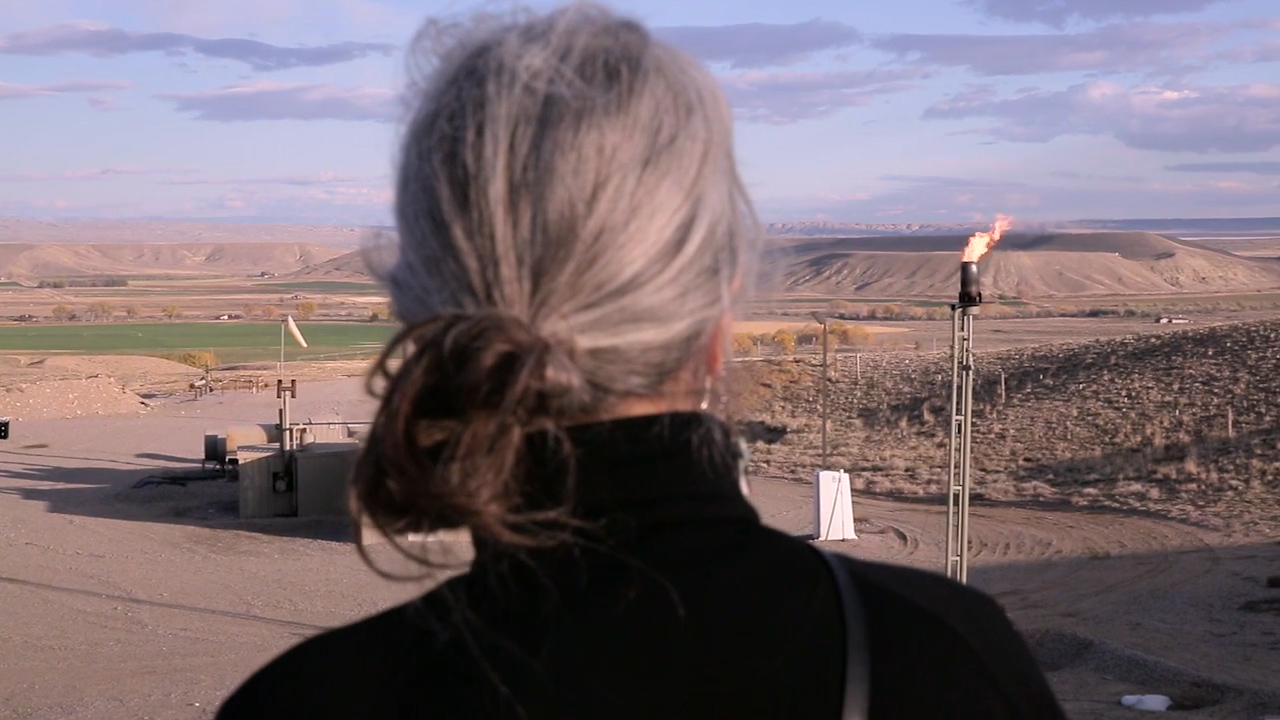
Deb looking out over an oil and gas development flaring near their home.
The wind blew and our whole horse pasture, 8 acres, and the whole creek bottom was just full of shredded plastic. And nobody cleans it up, there's no oversight. The state doesn't come out and say, "You gotta clean this up." It's left to the people that are living there. By the time they drilled the 4th well on that pad, they were using a closed loop system for the drilling and fracking fluids. They had a series of 6 or 7 pits that they opened and closed as waste pits, and they weren't lined. They just dig a hole and dump whatever chemicals, then they close it back up and open it again to dump more in it. I think that's when we started to realize this wasn't only a threat to the surface water, but also to the groundwater.
We asked that they test the well. The state wouldn't test it, and neither would the company. We kept asking for disclosure of the fluids that they were using because we were so worried about the water. Those days they wouldn't give you anything. The company already had a notice of violation, they tried to do a directional well. We have a lot of naturally occurring seismic activity, a lot of small earthquakes and fractures moving through this subsurface. So it was literally impossible for them to do that drill. They lost circulation of their drilling fluids and it all came up off the site. So, they drilled these sump holes in the side of the county road and brought in vat trucks to collect all the liquids. And then, they dumped it on the horse pasture of a man who was working for them. He let them do that! That’s how they got their first violation.
What was the seismic operation that occurred?
I should explain that in Wyoming, the oil industry can use the state's eminent domain laws, and at that time there was no surface zone or agreements at all. There's now a law that says they have to try to negotiate with the surface owner. We're on “split estate,” which means that the surface owner doesn't own all the minerals. Somebody else owns those mineral rights and the mineral estate has the right to produce the minerals. The surface owner can't stop the mineral owner from developing, they have the right to come in. A lot of people buy property in Wyoming not realizing that they don’t have any control over those minerals underneath their surface. The only right you have as a surface owner is to pay taxes. Part of exploring the minerals is seismic. There are different ways of doing seismic, in this area there was explosives. They map out a grid, and set charges along the lines of it every so many feet and then they set those off in succession. This shows them what the subsurface looks like. It's called a “3D seismic.”
What was life like with all the oil and gas development going on around you?
When the first pad was put in and the first four wells were drilled, all the wildlife just took off. One of the interesting things that you find in every area under development, is that it puts everybody on hold. Your life becomes put on hold. We were ready to put a house up, but that stopped because we didn't know what our property value was going to be. We didn't know what our water quality was going to be. We didn't know if we'd be able to get any money out of this beautiful piece of property. You don't know if your kid is sick because of the industrial development around you.
Then they put the second pad in. When they hit their target depth, they hit a really high pressure pocket reservoir of gas. The well kicked back and the gas pushed all of the drilling fluids and naturally occurring liquid hydrocarbons through the drill stem, out through the casing and into the highly fractured and fissured area in this drainage. That happened probably 8 or 9 in the morning, and in the early afternoon they started to see blowholes all around the pad. It looked like the mud pots in Yellowstone Park. By the time it was over, there were 35 of those blowholes as far as 350 feet out from the wellhead in every direction. Late in the afternoon they released the plumbing on the rig to allow the gas to come back up through the drill stem. They had to do that or the whole area would have exploded because the gas got into those fractures, and then just started pushing everything to the surface. It had nowhere to go. That was by far the most serious event that has happened up here. Everybody in the drainage had to be evacuated. We were out of our homes for 3 days while they tried to get control of the well. All of the groundwater was contaminated.
The company knew they had a huge problem, now they had drilling fluids and condensate flowing down the county road, all across the pad, into the creek. They evacuated 25 households and still hadn't called the state. When we evacuated, we couldn't take anything, even our horses, because they were worried it was going to ignite and they were going to have a real disaster on their hands. Now think about that. An industrial development has basically exploded, spewing highly explosive gas and really dangerous liquid chemicals all through a subdivision and a creek bottom, and they hadn't even called the state. They were issued their second notice of violation. As part of that violation, they could either be subject to the state taking them to court over the damages that they'd created, or they could join the state's voluntary remediation program. So, of course, they joined the voluntary remediation program, which allows them to monitor the contamination with the state's oversight.
How common are these blowouts and hazards during oil and gas developments?
This whole mess that happened here, happens all the time where oil and gas is developed. I've been working these issues for 20 years. I go in to evaluate contamination and try to help communities understand what they should be looking at and how to address it. I've gone all over the United States looking at contaminated areas. I've never seen it done right. In the old days, they didn't happen this close to where people live, and so they happened, and nobody paid any attention. Now, as the easy stuff has been harvested, they have to go a lot deeper, into a lot tighter geologic formations to get the product. They have to use more extreme technologies, like hydraulic fracturing. More chemicals are used, way closer to where people live. You hear about these incidents more, but they've always happened. This is highly industrialized development, it's not easy to do. It's very complex. And now, they're literally going 12,000 feet down through shale rock and blowing it apart to get fossil fuels.
What happened to the water quality in your community?
After the Windsor Energy’s Crosby blowout, they knew they were going to have to monitor water around the area that had been impacted. At that time they said, "Oh, the contamination will never cross the creek, never get into anybody's wells." Um, it took a year to the month to hit the first water well. And now, almost 10 years later, this area has not been remediated. When you start talking about contaminating aquifers, there's no easy fix. They have tried to do some “pump and treat” up there now. They did a couple of pilot projects to try to establish how they could clean up the deeper zones. The verdict’s still out.
What motivated you to start monitoring air quality?
The first 15 years that I worked on this stuff, I was driven by pure anger. I was so pissed off by what was happening to us. I couldn't believe that our government wasn't there to help us, that nobody that would do anything about what was happening to us. And if I had a nickel for every time someone said, “Oh, they can't do that, you just have it wrong.” I would be a millionaire. Because nobody can believe this, until you live through this, you can't believe it.
Most people recognize water contamination before they recognize air because you can see the changes in your water. We were very concerned about what had happened during the blowout because that was a lot of gas. My eyes and nose were running, but there was a lot of traffic on the road that day. So I thought it was from the dust and those truck fumes. When I finally ran outside, I realized I'd been working in my office all day. It was the gas, it was palpable.
That made us conscious of the fact that there was something going on with the air emissions. And the state didn't even come up to monitor the air until about two weeks later. I started going to other places, and we recognized that there were emissions coming from production fields, from tanks, separator equipment, venting. We were noticing emissions, and there were many episodes of stuff catching on fire on the pads, gas blowing out. You'd see big plumes of black smoke coming off or big clouds of what we thought was steam. During well stimulations, which were actually frack jobs, you'd have these big clouds of stuff come off. So you start to really pay attention to that.
We asked the state to monitor and, of course, they wouldn't. They didn't have any money to do it. And so, we decided to do it ourselves. I called Denny Larson at Global Community Monitor and said, "Hey, what would it cost for us to start doing some air monitoring in these fields?" At that point, he was just starting the 6 state study on air quality around fracking sites, and he said, "Well, if you want to do Wyoming, you can do it, and we have the funding to actually do the analysis if you can get people to do it." All the people that I was working with were like “YES, we want to do it!” And so, we started our own Bucket Brigade.
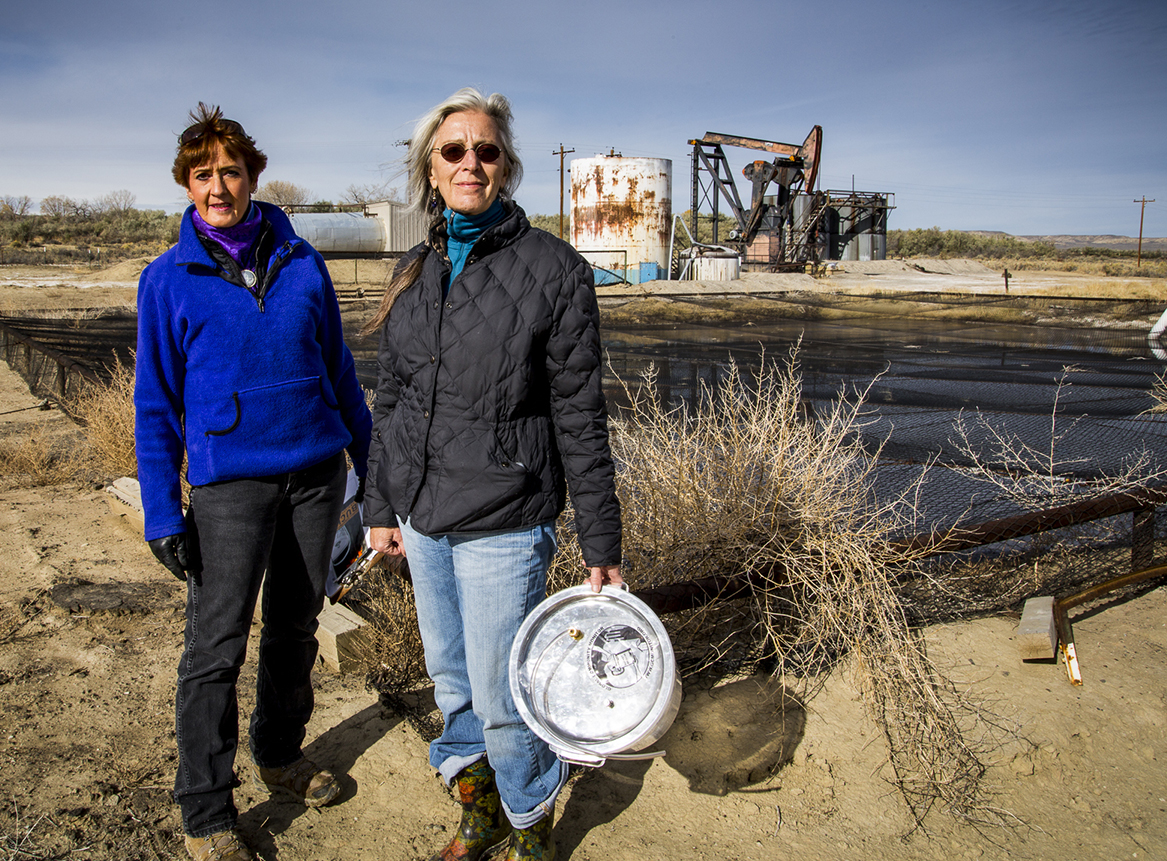
Deb and Genie with the Bucket Brigade's air sampling bucket near an oil and gas development.
Tell us a little bit about Bucket Brigade?
Global Community Monitor has a project called the Bucket Brigade. They come into the community and train you how to use the equipment, which is basically an air sample in a bucket.
You can test for various kinds of sulfur, volatile organic compounds, and methane using that system. You create a little army of people who go out and take samples of the air quality in their communities. After you collect the air sample, it's very important that you fill out an intricate chain of custody, and then you ship that sample overnight to a lab, which does the analysis. In Wyoming it was very easy to get to the pollution sources because we all live in such close proximity of these pads.
The problem with conventional air sampling is that the lab analysis is very expensive. While we were working with Global Community Monitor, we hooked up with Sara Wylie, an associate professor at Northeastern University in Boston, who is working on developing a method that will show the amount of H2S (hydrogen sulphide) in air without lab analysis. That's really important because it enables community members to know if hydrogen sulfide is actually near their homes, in their homes or in the fields where they're working. We were really interested in working with methods that would be more accessible to people, and cheaper.
What was the study about, what did it uncover?
The “Warning Signs” report and the peer reviewed journal article in Environmental Health, showed that these air emissions were at very high levels, very dangerous to human health.The study looked at air quality in six states, I was only involved in Wyoming. We took samples in 3 communities and one oil and gas field, including Clark where I live. In Pavillion, WY, where the EPA did a groundwater investigation, we looked at volatile organic chemicals venting from tanks and separator equipment at compressor stations. We did the buckets and we also placed formaldehyde badges on fence lines. In Clark, we found emissions off the freakin’ charts! So we were able to hold the oil company off. Right after the blowout, they got three permits in the subdivision, and were applying to drill in the Shoshone Forest. We were able to hold them off on all of those and none of them went through. We are very fortunate, we live with a lot of contamination, but we were able to stop the number of wells that could have moved into this area.
In the Deaver area, we were looking at hydrogen sulfide gas, which is a gas that's naturally occurring in the geologic formation that comes up with oil development. Pavillion & Clark are both gas development. Deaver is an old oil development, so there's a lot of H2S coming out of the formations. There we found hydrogen sulfide at extremely high levels. In Clark & Pavillion, we found volatiles at very high levels, a lot of benzene. It was shocking.
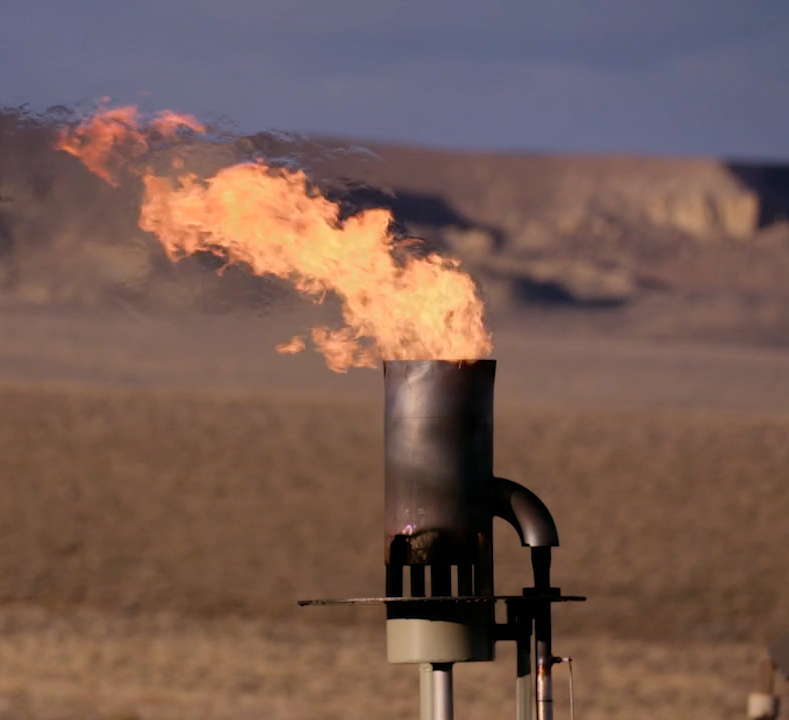
Gases are flared off at an oil drilling site.
We looked at the production phase of oil and gas development, we didn't do any sites during drilling or fracking. The average person on the street considers fracking to be the whole development of oil and gas. Industry and the regulators look at fracking as the hydraulic fracturing of those shale formations deep in the ground. I continually encourage people to talk about the full lifecycle of oil and gas development, not just fracking. We do know from looking at areas like Clark, Pavillion, and Deaver, that this development is the gift that keeps on giving. After you've drilled and fracked, all of these areas go into production, and that's when the infrastructure starts to fall apart. Then you see contamination because it takes a little while for it to move. Five, ten, twenty years down the line the whole area is one big stinking, contaminated mess with everybody sick from it.
What do hydrogen sulfide and benzene do to your health?
Benzene causes leukemia, it's very well documented. These compounds are very dangerous for human health. A lot of the stuff we found wasn't even regulated. One thing you have to keep in mind is the oil and gas industry has exemptions to the Clean Water Act, Safe Drinking Water Act and Clean Air Act. They don't have to comply with those federal environmental laws. They’re allowed to vent and use chemicals that no one else can, because the oil and gas industry is the most powerful industry in the world.
Hydrogen sulfide gas is a whole other beast because it replaces oxygen. Basically, if you're in an area with high levels of hydrogen sulfide, it will make you pass out because you're not getting any oxygen. At low levels, nobody really knows what it does, there's been very little study. In Wyoming, hydrogen sulfide is not monitored at the wellhead or in any discharges. Nobody even knows what the levels are. The people who live there, or farm in those areas, are just out walking around. If you don't have a detection badge, you don't even know when to get out. You can smell hydrogen sulfide gas at low levels, but once it reaches an extremely dangerous level you don't smell it anymore, and then you're dead.
Everybody I know that lives and works in these areas has experienced all kinds of upper respiratory problems: nosebleeds, nose polyps, headaches, rashes, neuropathy. There’s a lot of weird cancers, strange conditions, kidney problems, and urinary tract issues. You can't pin any of this on that development because none of it is monitored and recorded. So you're getting all these exposures, you're sick as a dog, and you go to the doctor. You don't even know what you're exposed to. The doctors have no idea. They look at you like you have two heads.
I worked with Powder River Basin for 15 years, we did a lot of policy work to change regulation. I came out of that experience recognizing that that's really important, but the people who live with this cannot wait for regulation to change. Regulation moves at a snail's pace, and industrial development is increasing faster and faster, exposing more and more people. I left that organization and decided that I wanted to get data to the people on the ground so they could make educated decisions about what to do in their lives. All these people on hold, living with this crap can decide whether they should leave, whether they need to get their kids out of the area. It's a human right to know whether you have clean water or air.
Do you think the peer review legitimized your efforts?
What happens with citizen science is everybody disses it. They say, “Oh, you're just doing it because you're a NIMBY”-Not In My BackYard. First of all, I'm proud to be a NIMBY. If everyone would take care of their own back yard, the whole planet would look a lot better. Second of all, wherever you live, you're the one who notices what's happening in your community. You're the one who sees it first. And so to diss that is really stupid. Academics and scientists are extremely important, and citizen scientists can't do it without having direction from them. But those people aren't living on the ground. If you can unite the people living on the ground and those people who are trained, it’s a strong union because you're getting both sides.
The peer reviewed article was extremely important because it gave validity to citizen science. People who, for instance, come and test our water well, they're trained in the protocols of how to collect those water samples. But they're not scientists. You don't have to be a scientist to do that. You have to be trained and follow the proper protocols to collect this data. And, if you live in an area that you're testing, you notice when those changes are happening. So you know when to test which is extremely important.
What would you say to someone with the attitude that a few people can suffer for the greater good, in terms of oil and gas development?
I truly believe that if we don't stop fossil fuels development, it's over. It's over for our species and it's over for the planet as we know it. Climate change isn't a theory, it's a reality. Fossil fuels extraction is causing climate change to happen rapidly. People who use the product need to really think about what it means to turn on those lights or drive those cars around. It used to be that this kind of development only happened in areas where there were only a few people. The reality is that easy stuff is already produced and there is no more of it. They have to go deeper. They have to use far more extreme technologies and it's coming to your house now too. Even if you don’t have an oil development next to you, air and water does not recognize state boundaries.
If everyone had to live with this development, that would definitely stop fossil fuels extractions. Just the little things - the spills, leaks, emissions, traffic, dust - ruins your quality of life. But when you start watching your family get sick, when your kid has a bloody nose for weeks on end and you can't figure out why, when you have constant headaches... you can't sleep because you have to get up every half hour to make sure something isn't exploding, erupting, or contaminating something. Yeah, it changes your whole perspective on fossil fuels. I believe that everybody that not only works for industry, but that is making all the big money in the industry should have to live right next to their development.
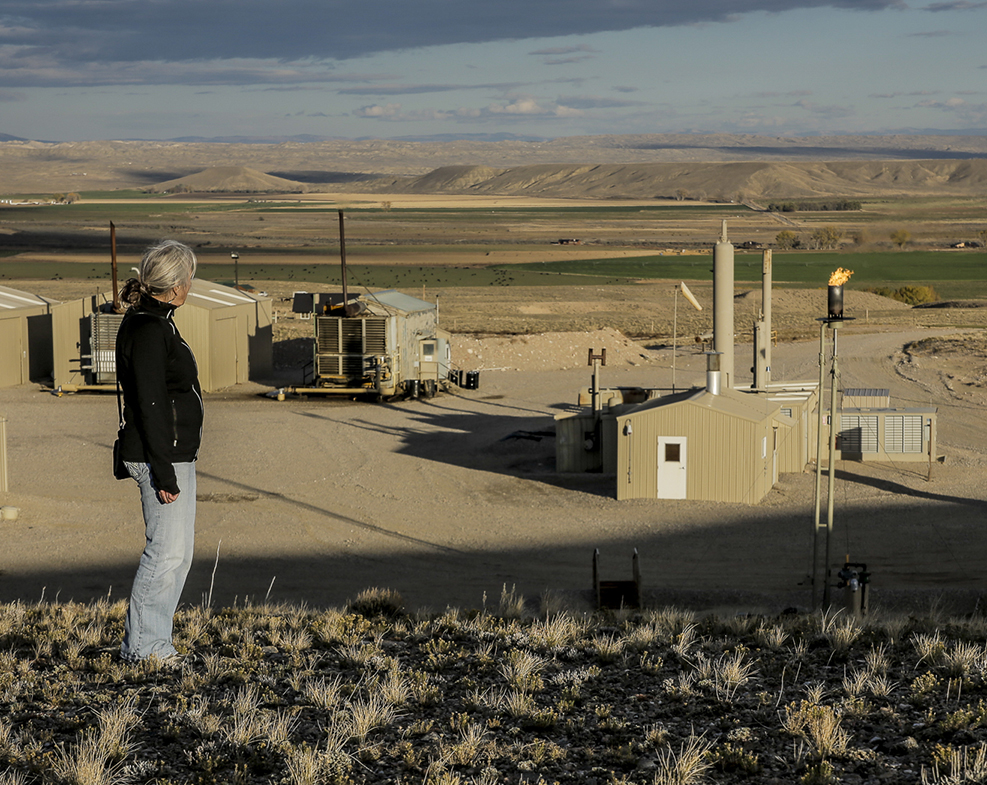
A large percentage of people in Wyoming are employed by oil and gas, does that make your work more difficult?
Industry gets very involved in government. Industry is given a lot of rights that regular citizens don't have. It's running the whole world. Our country has nothing left to sell but our resources. So this isn't going to end anytime soon until people just refuse to put up with it. I say kudos to places like New York who have been able to say, "No, we don’t want it." But that's becoming more and more difficult. One of the problems in Wyoming is that this last year they passed a trespass law, so the kind of data collection that we did, the whole Bucket Brigade process, cannot be done here anymore. You can collect resource data on private property if you have consent from that private property owner. You cannot collect any kind of resource data on “open land,” which is identified as anything outside of a municipality or subdivision that has a strong government. That’s all of the places that we monitored: state land, federal land, and county roads. (See also the Public Justice briefing paper on Wyoming’s so-called “Data Censorship Statutes.”)
Motivation for that law was actually over an organization called Western Watersheds, who I believe, collected water samples in streams where ranchers were using federal land for grazing and found a lot of bacterial contaminants in the water. But it doesn't stop there. It's any kind of resource data collection. I don't know if they had us in mind, but it sure stopped us. We can't collect any data on what’s happening right next to where we live. We can't take a picture, do air samples, or collect any data. It's ridiculous. We have to live with it and shut up, or go to jail and I think the fine is $10,000.
Do you have hope for the future?
I really believe in humanity. I believe our species has created amazing things and made amazing changes on this planet. I've incredible hope for the future in terms of what we can achieve, what's possible to achieve. We're responsible for beautiful art and music and just a host of amazing things. Unfortunately, we're also very greedy. So while I have incredible hope, I also worry about that aspect of our makeup. I think we're on the brink of a huge evolutionary shift, and I'm not a scientist so I don't know how that's going to happen. But I truly believe that's what's needed for our species to be able to continue.
People ask my husband Dick and me this question all the time: why did we stay? For one, if you invest everything that you've worked for during your life into a piece of property or a way of life, you can't just leave it and try and go start over at the stage of life that we're in. Secondly, I would never be bullied out of the area that I belong in. My family has been on the Beartooth Front for four generations, and I feel like I'm here to protect as much of it as I can. I owe that to my children and their children to all the animals that live here with us, and to my ancestors.
